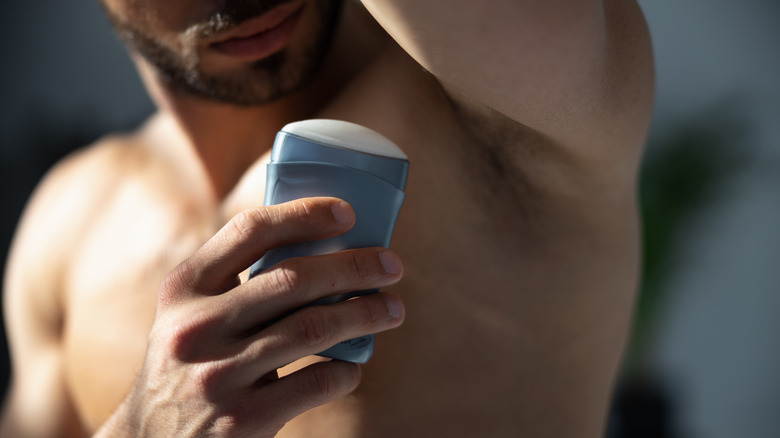Should You Use Clinical Strength Deodorant?
You probably started using deodorant at a young age and have been using it every day since then. If you're someone who sweats a lot or has particularly strong body odor, you may have looked into which types of deodorant are best for your situation. Clinical strength deodorant is marketed as a product that can help people who don't see ideal results with regular deodorant. But do you really need to use it?
Let's start with how deodorant works. To begin with, there is technically a difference between deodorants and antiperspirants. Deodorants are designed to mask odor, typically containing alcohol and perfume to cover up the scent of sweaty armpits (via Healthline). Antiperspirants are created to prevent sweating and often contain perfume to mask odor as well. Antiperspirants usually contain aluminum that blocks pores and prevents moisture from reaching your skin. However, these two terms are often used interchangeably today.
Both clinical strength deodorants and antiperspirants use a higher concentration of active ingredients to produce stronger effects (via Bustle). Dr. Lisa Chipps, a board-certified dermatologist, suggests layering both deodorant and antiperspirant for the best effect.
Clinical strength deodorant isn't effective unless used correctly
If you're going to shell out the extra money for a clinical strength product, you should know how to get the most benefits from it. According to Verywell Health, an antiperspirant product won't be effective if it's not applied correctly. "They should be applied when the armpit is completely dry," Louis Kuchnir, a dermatologist based in Boston, Massachusetts, said. "The aluminum will find the water in the top of the sweat gland, get in there, and cause it to become viscous and block the sweat gland all day long. So applying it when your armpit is completely dry is important."
If you're avoiding an antiperspirant and sticking with deodorant, choose a product that works with your skin type. Most deodorants contain perfume or fragrances to mask the odor of your underarms. However, these can cause irritation to people with sensitive skin. If you get a rash or itchy skin after applying deodorant, choose a product that is labeled as fragrance-free. This means there are no added fragrances in the product that might cause irritation.


